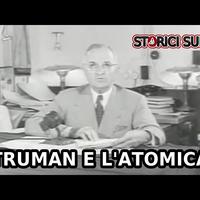La STORIA di come Truman decise di sganciare la BOMBA ATOMICA
||||Truman|||drop|||atomic
|||||decise||lanciare|||
Die GESCHICHTE, wie Truman beschloss, die ATOMBOMBE abzuwerfen
The STORY of how Truman decided to drop the ATOMIC BOMB
La HISTORIA de cómo Truman decidió lanzar la BOMBA ATÓMICA
L'HISTOIRE de la façon dont Truman a décidé de larguer la BOMBE ATOMIQUE
La STORIA di come Truman decise di sganciare la BOMBA ATOMICA
トルーマンが原爆投下を決断するまでのSTORY
Truman이 ATOMIC BOMB을 투하하기로 결정한 이야기
HISTORIA o tym, jak Truman zdecydował się zrzucić BOMBĘ ATOMOWĄ
A HISTÓRIA da decisão de Truman de lançar a BOMBA ATÓMICA
杜鲁门如何决定投放原子弹的故事
杜鲁门如何决定投下原子弹的故事
L'impiego di armi atomiche costrinse i giapponesi ad arrendersi.
use||weapons||forced||||surrender
uso||||costrinse||||arrendersi
Der Einsatz von Atomwaffen zwang die Japaner zur Kapitulation.
The use of atomic weapons forced the Japanese to surrender.
使用原子武器迫使日本投降。
Molti sostengono che i bombardamenti non fossero necessari, affermando che metodi più convenzionali
|argue|||bombings||were||asserting||||conventional
|ritengono|||||||sostenendo||||
Viele argumentieren, dass die Bombardierung unnötig war, da konventionellere Methoden
Many argue that the bombing was unnecessary, arguing that more conventional methods
potevano essere altrettanto efficaci.
could||equally|effective
könnte ebenso wirksam sein.
they could be just as effective.
Secondo le stime, l'invasione del Giappone avrebbe provocato centinaia di migliaia di
||estimates|the invasion|||||hundreds||thousands|
||stime||||||centinaia|||
Die Invasion Japans hat schätzungsweise Hunderttausende von Menschenleben gekostet.
According to estimates, the invasion of Japan would have resulted in hundreds of thousands of
vittime da entrambe le parti, quindi il presidente Truman pensava di risparmiare delle vite.
victims||both|||so||||||save||
|||||||||||salvare delle vite||
Opfer auf beiden Seiten, so dass Präsident Truman dachte, er würde Leben retten.
victims on both sides, so President Truman thought he was saving lives.
Alcuni sostengono che far cadere la bomba atomica fosse la sua unica opzione.
|argue||drop|to fall|||||||only|option
|sostengono|||||||||||
Einige behaupten, dass der Abwurf der Atombombe seine einzige Option war.
Some argue that dropping the atomic bomb was his only option.
Se il pubblico avesse appreso che il Presidente avesse avuto a disposizione un'arma che avrebbe
||||learned||||||||a||
||||saputo||||||||||
Wenn die Öffentlichkeit erfahren hätte, dass der Präsident über eine Waffe verfügte, hätte das
If the public learned that the President had a weapon at his disposal he would have
potuto porre fine alla guerra nel 1945, ma avesse scelto di non usarla, l'opinione pubblica
|have||||||if he had|chosen|||use it||
|porre fine|||||||scelta|||||
den Krieg 1945 hätte beenden können, sich aber dagegen entschied, die öffentliche Meinung
could have ended the war in 1945, but had chosen not to use it, public opinion
avrebbe potuto giudicarlo come debole e incompetente.
||judge||weak||incompetent
||||fragile||
hätte ihn als schwach und inkompetent einschätzen können.
he might have judged him as weak and incompetent.
Il presidente Truman sopporterà il peso di questa decisione per il resto della sua vita,
|||will bear||the burden|||||||||
|||porterà|||||||||||
Präsident Truman wird für den Rest seines Lebens die Last dieser Entscheidung tragen,
President Truman will bear the brunt of this decision for the rest of his life,
"Ho fatto quello che pensavo fosse giusto".
||||thought|was|right
"Ich habe getan, was ich für richtig hielt".
"I did what I thought was right."

